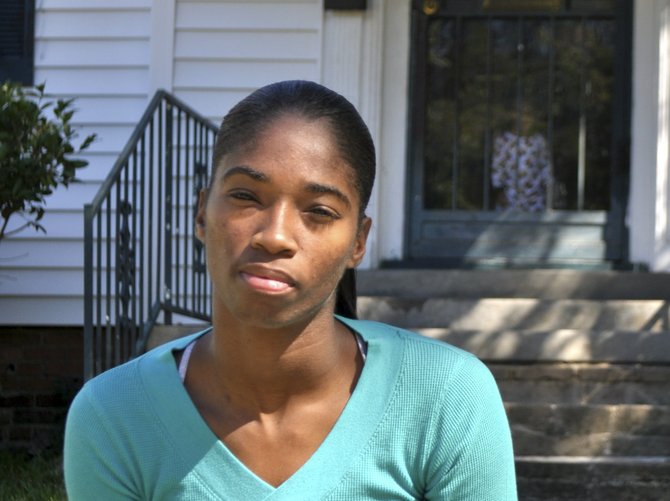William Brown’s wife, DeUndra, believes her husband was victimized twice—once at the hands of his killer and again by a state law that allows people to carry guns openly. Photo by Trip Burns
After quarrelling with a man the night of Sept. 20, William Brown was convinced that the man and his brothers would try to kill him. Brown, who went by the nickname "Nod," even told his wife that he thought the brother's family was gunning for him.
A day later, just after 5 p.m., Brown proved fatally prophetic when, near the intersection of Doctor Moton Street and Smith Robinson Road in the Virden Addition neighborhood, the brother of the man Brown beefed with the night before shot him 12 times.
Police took the shooter, who did not flee the scene, into custody and after questioning him, let him go in time to attend a concert at a local nightclub, Brown's family members said.
"I'm at a loss for words because the guy who shot my husband gets to go free. He shot my husband 12 times. I don't see that as self-defense," Nod's wife, DeUndra Brown, told the Jackson Free Press last week.
Almost as unsettling is her belief that one reason police declined to charge the shooter was because both men were allowed to have guns, according to an open-carry law the Legislature passed this year. After a brief court battle, the law took effect in August.
DeUndra Brown, who returned from military training three weeks before her husband's death and was not aware of the HB2's passage until her husband's death, believes the law is making it easier for people to kill each other instead of serving as a deterrent to crime.
"They think the crime is going to decrease now?" she asked. "I just see more death occurring in the future."
William Brown's death appears to give credence to fears that local law-enforcement officials expressed when they filed a lawsuit to prevent the controversial law, HB 2, from going into effect.
"It's difficult to determine who is a threat, and (who) isn't a threat," Hinds County District Attorney Robert Shuler Smith said just before the law's planned effective date of July 1. Calls to Smith and JPD's Deputy Chief Deric Hearn, with whom Brown has been in communication about her husband's death investigation, were not returned for this story.
Smith, along with JPD and the Hinds County Sheriff's office, joined in a lawsuit that met brief success when Hinds County Circuit Court Judge Winston Kidd enjoined the gun law that state Attorney General Jim Hood admitted would "be pretty tricky for cops on the street" to enforce. The state Supreme Court overturned Kidd's decision, allowing the law's implementation to go forward.
DeUndra Brown suspects the law may also have the effect of giving police an excuse to not investigate crimes that are more complicated to untangle. JPD has said William Brown's death remains under investigation, but at the time of the shooting, JPD Assistant Chief Lee Vance told a TV reporter that police did not make an arrest because witnesses said Brown initiated a gun battle.
"He shot at the other guy first. Apparently he missed, then the other guy returned fire striking him about 12 times. It's not for me to judge the amount of rounds that were fired. I don't know if the amount of times he fired his weapon is of any circumstance at this point," Vance told WLBT-TV's Cheryl Lasseter.
Matt Steffey, a professor of constitutional law at the Mississippi College School of Law in Jackson, explained that although police and district attorneys have a lot of discretion in terms of whether to arrest or charge people with crimes, in all deliberate shootings a prima facie case for assault exists or, if the victim dies, for homicide.
"(If) I pick up a gun and shoot you, even in self defense, I have met the elements of intentional homicide," Steffey said.
DeUndra Brown describes her husband as a fun guy who loved being a father to his 16-month-old daughter and 11-year-old son and mentoring neighborhood kids on how to break into the music industry.
She believes that if a witness to her husband's shooting contacts JPD and tells police what they say, it might move the investigation along and help bring the shooter to justice.
"It hurts me that nobody in that neighborhood will speak up. He would have done anything for them," she said.


